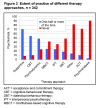Psychotherapy in Contemporary Psychiatric Practice
- PMID: 26175328
- PMCID: PMC4501587
- DOI: 10.1177/070674371506000609
Psychotherapy in Contemporary Psychiatric Practice
Abstract
Objective: American data suggest a declining trend in the provision of psychotherapy by psychiatrists. Nevertheless, the extent to which such findings generalize to psychiatric practice in other countries is unclear. We surveyed psychiatrists in British Columbia to examine whether the reported decline in psychotherapy provision extends to the landscape of Canadian psychiatric practice.
Method: A survey was mailed to the entire population of fully licensed psychiatrists registered in British Columbia (n = 623). The survey consisted of 30 items. Descriptive statistics were used to characterize the sample and psychotherapy practice patterns. Associations between variables were evaluated using nonparametric tests.
Results: A total of 423 psychiatrists returned the survey, yielding a response rate of 68%. Overall, 80.9% of psychiatrists (n = 342) reported practicing psychotherapy. A decline in the provision of psychotherapy was not observed; in fact, there was an increase in psychotherapy provision among psychiatrists entering practice in the last 10 years. Individual therapy was the predominant format used by psychiatrists. The most common primary theoretical orientation was psychodynamic (29.9%). Regarding actual practice, supportive psychotherapy was practiced most frequently. Professional time constraints were perceived as the most significant barrier to providing psychotherapy. The majority (85%) of clinicians did not view remuneration as a significant barrier to treating patients with psychotherapy.
Conclusions: Our findings challenge the prevailing view that psychotherapy is in decline among psychiatrists. Psychiatrists in British Columbia continue to integrate psychotherapy and pharmacotherapy in clinical practice, thus preserving their unique place in the spectrum of mental health services.
Objectif :: Des données américaines suggèrent une tendance à la baisse de la prestation de psychothérapie par les psychiatres. Néanmoins, la mesure dans laquelle ces résultats se généralisent aux pratiques psychiatriques d’autres pays n’est pas claire. Nous avons interrogé des psychiatres de la Colombie-Britannique pour examiner si la baisse de la prestation de psychothérapie s’étend à l’ensemble de la pratique psychiatrique canadienne.
Méthode :: Un sondage a été posté à toute la population des psychiatres pleinement licenciés enregistrés en Colombie-Britannique (n = 623). Le sondage consistait en 30 items. Des statistiques descriptives ont servi à caractériser l’échantillon et les modèles de pratique de psychothérapie. Les associations entre variables ont été évaluées à l’aide de tests non paramétriques.
Résultats :: En tout, 423 psychiatres ont renvoyé le sondage, pour un taux de réponse de 68 %. Globalement, 80,9 % des psychiatres ont déclaré pratiquer la psychothérapie. Aucune baisse de la prestation de psychothérapie n’a été observée; en fait, il y a eu une augmentation de la prestation de psychothérapie chez les psychiatres qui ont commencé leur pratique dans les 10 dernières années. La thérapie individuelle était le format prédominant utilisé par les psychiatres. La principale orientation théorique la plus courante était psychodynamique (29,9 %). En ce qui concerne la pratique actuelle, la psychothérapie de soutien était la plus souvent pratiquée. Les contraintes de temps des professionnels étaient perçues comme étant l’obstacle le plus significatif à la prestation de psychothérapie. La majorité (85 %) des cliniciens ne voyaient pas la rémunération comme un obstacle significatif à traiter les patients par psychothérapie.
Conclusions :: Nos résultats remettent en question le point de vue dominant selon lequel la psychothérapie serait en baisse chez les psychiatres. Les psychiatres de la Colombie-Britannique continuent d’intégrer la psychothérapie et la pharmacothérapie dans la pratique clinique, préservant ainsi leur place unique dans le spectre des services de santé mentale.
Figures


Comment in
-
Improving Access to Psychosocial Treatments--Integrating Patient, Provider, and Systems Approaches.Can J Psychiatry. 2015 Jun;60(6):242-4. doi: 10.1177/070674371506000602. Can J Psychiatry. 2015. PMID: 26175321 Free PMC article. No abstract available.
Similar articles
-
Do psychopharmacologists speak to psychotherapists? A survey of practicing clinicians.Psychodyn Psychiatry. 2012 Jun;40(2):275-85. doi: 10.1521/pdps.2012.40.2.275. Psychodyn Psychiatry. 2012. PMID: 23006119
-
Characteristics of psychiatrists who perform ECT.Am J Psychiatry. 1998 Jul;155(7):889-94. doi: 10.1176/ajp.155.7.889. Am J Psychiatry. 1998. PMID: 9659852
-
Psychiatrists offering less psychotherapy.Harv Ment Health Lett. 2008 Nov;25(5):7. Harv Ment Health Lett. 2008. PMID: 19043837 No abstract available.
-
Obstacles to early career psychiatrists practicing psychotherapy.Psychodyn Psychiatry. 2014 Sep;42(3):479-95. doi: 10.1521/pdps.2014.42.3.479. Psychodyn Psychiatry. 2014. PMID: 25211434 Review.
-
The treatment of psychotic depression: is there consensus among guidelines and psychiatrists?J Affect Disord. 2013 Feb 20;145(2):214-20. doi: 10.1016/j.jad.2012.07.036. Epub 2012 Sep 27. J Affect Disord. 2013. PMID: 23021823 Review.
Cited by
-
Improving Access to Psychosocial Treatments--Integrating Patient, Provider, and Systems Approaches.Can J Psychiatry. 2015 Jun;60(6):242-4. doi: 10.1177/070674371506000602. Can J Psychiatry. 2015. PMID: 26175321 Free PMC article. No abstract available.
-
Standalone DBT Group Skills Training Versus Standard (i.e. All Modes) DBT for Borderline Personality Disorder: A Natural Quasi-experiment in Routine Clinical Practice.Community Ment Health J. 2020 Feb;56(2):238-250. doi: 10.1007/s10597-019-00485-7. Epub 2019 Oct 31. Community Ment Health J. 2020. PMID: 31673877
-
Making Evidence-Based Psychotherapy More Accessible in Canada.Can J Psychiatry. 2016 Oct;61(10):618-23. doi: 10.1177/0706743716642416. Epub 2016 Apr 5. Can J Psychiatry. 2016. PMID: 27310234 Free PMC article. No abstract available.
-
European Psychiatric Association policy paper on ethical aspects in communication with patients and their families.Eur Psychiatry. 2020 Apr 1;63(1):e36. doi: 10.1192/j.eurpsy.2020.33. Eur Psychiatry. 2020. PMID: 33289623 Free PMC article.
-
An appraisal of psychotherapy training during psychiatry residency program in India: A national survey.Indian J Psychiatry. 2024 Apr;66(4):373-380. doi: 10.4103/indianjpsychiatry.indianjpsychiatry_24_23. Epub 2024 Apr 22. Indian J Psychiatry. 2024. PMID: 38778852 Free PMC article.
References
-
- Leichsenring F, Rabung S. Long-term psychodynamic psychotherapy in complex mental disorders: update of a meta-analysis. Br J Psychiatry. 2011;199(1):15–22. - PubMed
-
- Shedler J. The efficacy of psychodynamic psychotherapy. Am Psychol. 2010;65(2):98–109. - PubMed
-
- Spielmans GI, Berman MI, Usitalo AN. Psychotherapy versus second-generation antidepressants in the treatment of depression: a meta-analysis. J Nerv Ment Dis. 2011;199(3):142–149. - PubMed
Publication types
MeSH terms
LinkOut - more resources
Full Text Sources
Other Literature Sources

